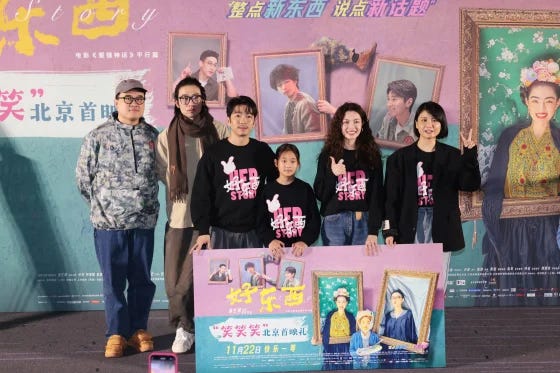Chinese Feminists Use Comedy to Challenge Gender Norms Amid Growing Resistance
With more women embracing stand-up and audiences flocking to female-led films, China’s feminist movement is finding its voice through humor.
BEIJING — In a time when feminist activism in China faces increasing restrictions, a new avenue for expression is emerging—comedy. Women are taking to stand-up stages and cinema screens, using humor to challenge societal norms and push for gender equality.
Despite economic struggles and government efforts to reinforce traditional gender roles, a growing number of women in China are turning to comedy as a way to navigate and critique their reality. In a small Western-style restaurant in Beijing on a cold winter evening, amateur comedians performed for an intimate crowd of about 20, most of them young women.
Among the lineup was Alex Wang, the only female comedian that night. Wang described feeling “empowered” when she first took the stage, saying, “Being funny is the most important thing, but I also want to grow—not just as a comedian, but as a woman finding her voice in this space.”
The increasing presence of women in China’s stand-up comedy scene, coupled with the success of female-led films, signals a shift in the way feminist themes are entering the mainstream.
Feminism Through Laughter
While China’s feminist movement continues to face resistance, the success of comedy-focused films led by women reflects a growing audience for female-driven narratives.
Last year, the feminist comedy Her Story became a box-office hit, earning praise even from state media. The People’s Daily, a government-run newspaper, highlighted the film’s portrayal of the “humorous and absurd” aspects of everyday life. Dubbed China’s answer to Barbie, the film openly addressed issues such as gender stereotypes, single motherhood, and divorce—topics that remain sensitive in the country.
Feng Yuan, the founding director of the women’s rights group Beijing Equality, explained that comedy provides a unique advantage for feminist discourse. “Comedy allows for social critique in a way that avoids direct confrontation with censors,” she said. “It’s also a powerful tool to express frustration.”
The film follows Wang Tiemei, a single mother recently laid off from her job, and her young neighbor Xiao Ye, as they navigate personal and societal challenges, including domestic abuse. The film’s bold approach to discussing female experiences has drawn comparisons to U.S. films like Babygirl, an erotic thriller starring Nicole Kidman, which sparked similar discussions on female agency.
Audiences have responded enthusiastically. “It’s rare to see stories about single mothers or just women’s lives in general,” said Zhang Tong, 25, after watching Her Story in Beijing. “This film will help more women understand themselves better and feel empowered to live for themselves.”
Since its release in November, Her Story has earned 720 million yuan ($99 million) and boasts a 9.1 rating on the Chinese film site Douban. While it didn’t break into China’s top 10 highest-grossing films, another female-led movie, Yolo, dominated the box office, earning 3.4 billion yuan ($470 million). Directed by comedian Jia Ling, Yolo followed the success of her 2021 hit Hi, Mom, which grossed $742 million—making her the highest-grossing female filmmaker in the world until Greta Gerwig’s Barbie surpassed her.
This trend marks a shift in China’s film industry, which has historically been dominated by male-centric and patriotic blockbusters. “My movie offers something different, a fresh perspective,” said Her Story director Shao Yihui in an interview with state broadcaster CCTV.
Stand-Up as a Feminist Platform
Alongside the rise of female-led films, more women are stepping into China’s stand-up comedy scene, an industry that until recently was dominated by men.
Alex Wang, who performs regularly in Beijing, explained that much of her material is drawn from her experiences as a woman. “I have jokes about men who assume every woman is attracted to them,” she said. “I also talk about period stigma.”
One of China’s most recognizable female comedians, Yang Li, gained widespread attention for her sharp critiques of male behavior, performing on national television in front of millions. “What she and other female comedians talk about really reflects the current state of society,” Wang said. “Their material brings attention to women’s issues, and you can see how those jokes resonate.”
However, not everyone is amused. In October, Chinese e-commerce giant JD.com cut ties with Yang after male social media users accused her of promoting “gender antagonism.” Similar criticisms of feminism have been echoed in Chinese state media.
“There’s growing resistance to feminist voices in China, and Yang became an easy target,” said Feng. “Some people are always looking for an outlet for their anger.”
Chinese comedians also face strict censorship. In 2023, a stand-up comedian’s entertainment firm was fined nearly $2 million after he was accused of making jokes that insulted the People’s Liberation Army. The backlash temporarily stalled China’s stand-up industry, which only returned to television in late 2023.
Nico Toomuch, a 34-year-old stand-up comedian in Beijing, acknowledged the challenges of performing in China. “A lot of topics are sensitive—we’re not always sure what we can joke about,” she said.
Despite these obstacles, she believes women bring a unique perspective to comedy. “We’re more observant, more emotional. That’s why we can take a joke—and why we can deliver one.”
A Changing Landscape
As China’s feminist movement continues to face hurdles, women are carving out spaces in entertainment to tell their stories. Through stand-up and film, they are not only making audiences laugh but also challenging deeply ingrained gender norms.
While the road ahead remains uncertain, the rise of female-led comedy signals an undeniable shift. Whether on stage or in theaters, women in China are finding their voices—one punchline at a time.


